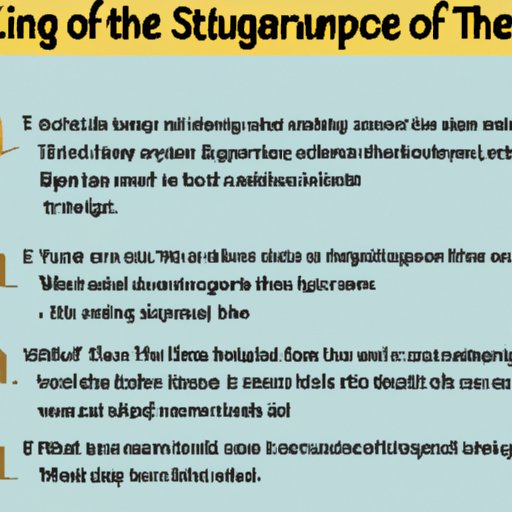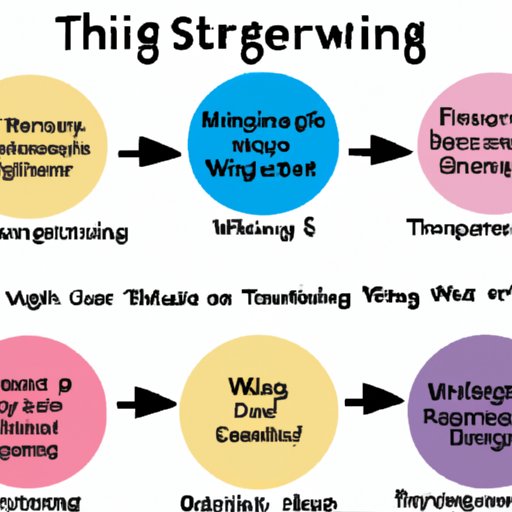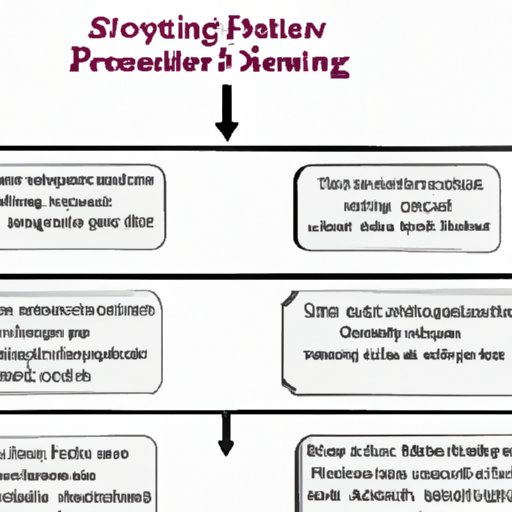Introduction
The writing process is an essential part of creating any type of written work. It involves planning, researching, organizing, revising, and polishing your work in order to produce a finished piece. The writing process can be broken down into five distinct stages – brainstorming, research, outlining, drafting, and editing. Each stage has its own importance and contributes to the overall success of the final written product.

Detailed Explanation of the 5 Stages of the Writing Process
The first stage of the writing process is brainstorming. This is the process of generating ideas for your written work. During this stage, it is important to consider the purpose of your writing and what you want to communicate to your readers. Brainstorming can be done by writing down words or phrases that come to mind when thinking about your topic, or by using mind maps, diagrams, or other visual tools to organize your thoughts.
The second stage of the writing process is research. This is the process of gathering information on your topic in order to create an informed and accurate piece of writing. Research can involve reading books, articles, and other sources of information, as well as interviewing experts on the subject matter. It is important to make sure that the information you gather is reliable and up-to-date.
The third stage of the writing process is outlining. This is the process of organizing your ideas and information in a logical way. Outlining helps you structure your writing and ensure that all the points you want to make are included in your work. Outlines can be created in many different ways, such as using lists, tables, or diagrams.
The fourth stage of the writing process is drafting. This is the process of writing down your ideas and information in an organized manner. During this stage, it is important to focus on getting your thoughts out on paper without worrying too much about grammar and spelling. After completing a draft, you can then move on to the next stage.
The fifth and final stage of the writing process is editing. This is the process of revising and polishing your work in order to make it the best it can be. During this stage, it is important to read through your work carefully and make corrections where necessary. This includes checking for grammar and spelling errors, making sure the flow of your writing is smooth, and ensuring that all the points you wanted to make are clearly expressed.

Tips to Help Writers Get Through Each Stage of the Writing Process
When going through each stage of the writing process, there are certain tips and strategies that can help make the process easier and more efficient. For brainstorming, it can be helpful to use visual aids such as mind maps or diagrams to organize your ideas. For research, it is important to make sure that all the information you find is reliable and up-to-date. When outlining, it can be helpful to break down your ideas into smaller sections to make them easier to organize. When drafting, it can be beneficial to write without worrying too much about grammar and spelling so that you can get your thoughts out on paper. Finally, when editing, it is important to read through your work carefully and make any necessary corrections.
Examples of How Successful Writers Have Used the 5 Stages of the Writing Process
In order to gain a better understanding of how the 5 stages of the writing process can be used to create successful pieces of writing, it can be useful to look at examples of how successful authors have used the 5 stages. This can include looking at interviews with authors, reading case studies of successful writers, or studying the works of renowned authors to see how they have used the 5 stages of the writing process.

Comparison of the 5 Stages of the Writing Process With Other Methods of Writing
The 5 stages of the writing process can be compared to traditional methods of writing, such as pen and paper writing, as well as to online and digital methods of writing. Traditional methods of writing require more time and effort, as well as physical materials, such as paper and pens. On the other hand, online and digital methods of writing are faster and more efficient, and do not require physical materials. However, both traditional and digital methods of writing still require the same 5 stages of the writing process in order to create a successful piece of writing.
Benefits of Using the 5 Stages of the Writing Process
Using the 5 stages of the writing process can help improve the quality of your written work, as well as make the writing process more efficient. By going through each stage of the writing process, you can ensure that your writing is well organised, coherent, and accurate. Additionally, by going through each stage, you can also increase your understanding of the topic you are writing about.
Conclusion
In conclusion, the 5 stages of the writing process are essential for producing high-quality written work. By going through each stage – brainstorming, research, outlining, drafting, and editing – writers can ensure that their work is well organised, coherent, and accurate. Additionally, using the 5 stages of the writing process can also help make the writing process more efficient and increase understanding of the topic being written about.
(Note: Is this article not meeting your expectations? Do you have knowledge or insights to share? Unlock new opportunities and expand your reach by joining our authors team. Click Registration to join us and share your expertise with our readers.)
